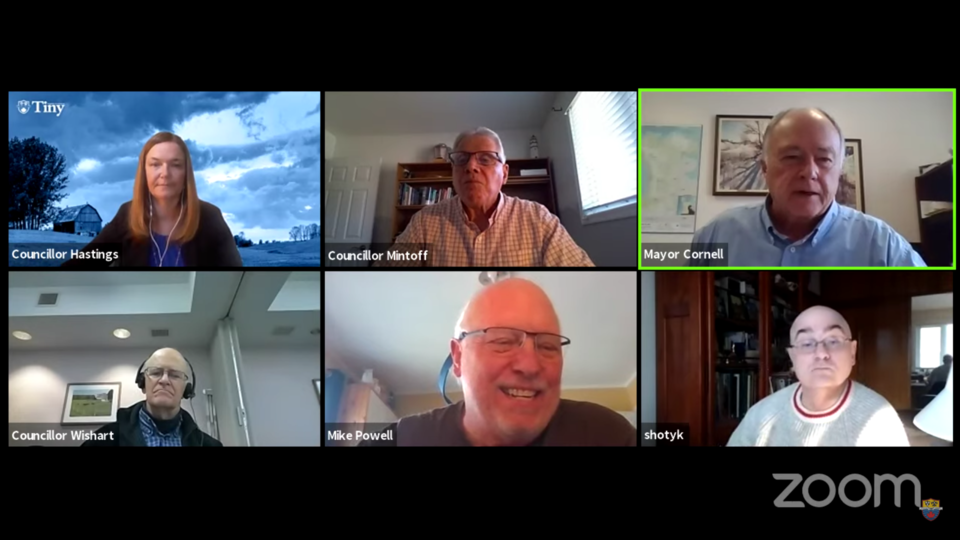Two University of Alberta scientists gave Tiny council a taste of the municipality's superior groundwater while asking the township to collaborate on a project they hope to launch next year.
William Shotyk and Michael Powell were at a recent committee of the whole meeting to present the work they've done so far studying the artesian spring present in this region of Ontario.
"The groundwater has below detection limits of nitrates and phosphates," said Shotyk, professor and Bocock agriculture and the environment chair. "It's an indication of the water quality. The other parameter is chloride.
"Based on the work I've done to-date, chloride is just a little bit less than 1 mg per litre. It's rather outstanding, because according to Prof. John Cherry (University of Waterloo), pristine groundwater has less than 5 mg of chloride per litre."
He said he studies trace elements in the environment and has dedicated research wells on his Tiny Township property for studying the water.
"This groundwater contains one part per trillion of lead," said Shotyk. "It's cleaner than ancient arctic ice."
However, he said, some of this ultra-clean water is young.
"It's more recent than 1950," said Shotyk, explaining he determines that based on traces of tritium, which show up in water after the 1950s.
"This water I'm talking about is not just great water, it's absolutely exceptional water," he added. "I think we should treasure this water. The Elmvale Foundation will do everything it can to protect this water for future generations."
Powell, a professor with the university's Agricultural, Life and Environmental Science, Renewable Resources Department, then talked about the specific area of concern to council: French's Hill, where the Teedon Pit is located.
"Water that falls on the top of French's Hill infiltrates down into the clay bed," he said. "It's a gentle slope from French's Hill. There are wetlands at the 250-metre elevation. There are also wetlands below that."
However, Powell added, to unwrap the hydrogeology of the area, they would have to drill three holes on top of French's Hill, and then drill wells on Shotyk's farm.
"It's very expensive and complicated," he said. "We're not looking just to publish a bunch of information in journals, we want to impact land-use change and have value addition.
"That comes in through partnership. We're especially concerned with the needs of Tiny Township and how the project can actually help the municipality. We formally want to involve Tiny Township as a stakeholder in this project. The data that we provide potentially can inform policy for protection of the resource."
The way they want to do that, said Powell, is through an NSERC (National Sciences and Engineering Research Council of Canada) Alliance grant, for a multi-million-dollar, five-year project.
"We will give regular updates on all the information we collect," he added. "We know resources are stretched and we have to work out the modalities of just how much time and effort Tiny can put into this. But we hope somebody can be a liaison with us for Tiny Township."
Powell said they wouldn't dictate what the township needs to do to participate, but hope there will be an in-kind contribution.
"That some staff will have to dedicate some hours to us to stay up-to-date on it and be aware of what's going on," he said. "As far as the land goes, Bill has already arranged for a spot with a private landowner for a spot the well will go in."
Coun. Gibb Wishart was immediately onboard.
"I'm desperate to see your investigation produce a document that we can put in the face of the ministry of natural resources and the province of Ontario with the long-term thought that we stop all gravel extraction on French's Hill," he said. "I think that's a bit of a hope because there is some serious money that will be working to diminish the importance of your work.
"They're determined that the political types will decide that gravel is more important than water. I'm a fan of your work, but I'm also a fan of filling the lawn at Queen's Park."
Where both said they couldn't comment on the impact of the permit to take water applications without studying the area, they did answer a pointed question posed by Coun. Tony Mintoff.
"In terms of the potential availability of water," he asked, "do you feel the drawing of millions of litres of water from that area could have any kind of negative impact on the future availability of the water resource itself?"
Powell said if one looks at the number of people that rely on that water, it makes sense that anything that disrupts water to that water table is going to impact that water flow.
"How much? We don't know that yet," he added. " When you remove that soil cover, there are going to be consequences. That is also what we want to know through the study."
That's why Shotyk said it's very important to have all of the stakeholders at the table, even the aggregate companies vying for the water.
"Tiny Township council could help us get everybody to the table," he said. "In the interest of transparency, if an aggregate company has data that shows there's no possible way for their industry to impact the water, please show us the data. What we're looking for is engagement and involvement and transparency. For local citizens to have trust, there needs to be transparency."
Council received the presentation as information and directed staff to report back on the parameters of a partnership with the project, including the role the township would play.
